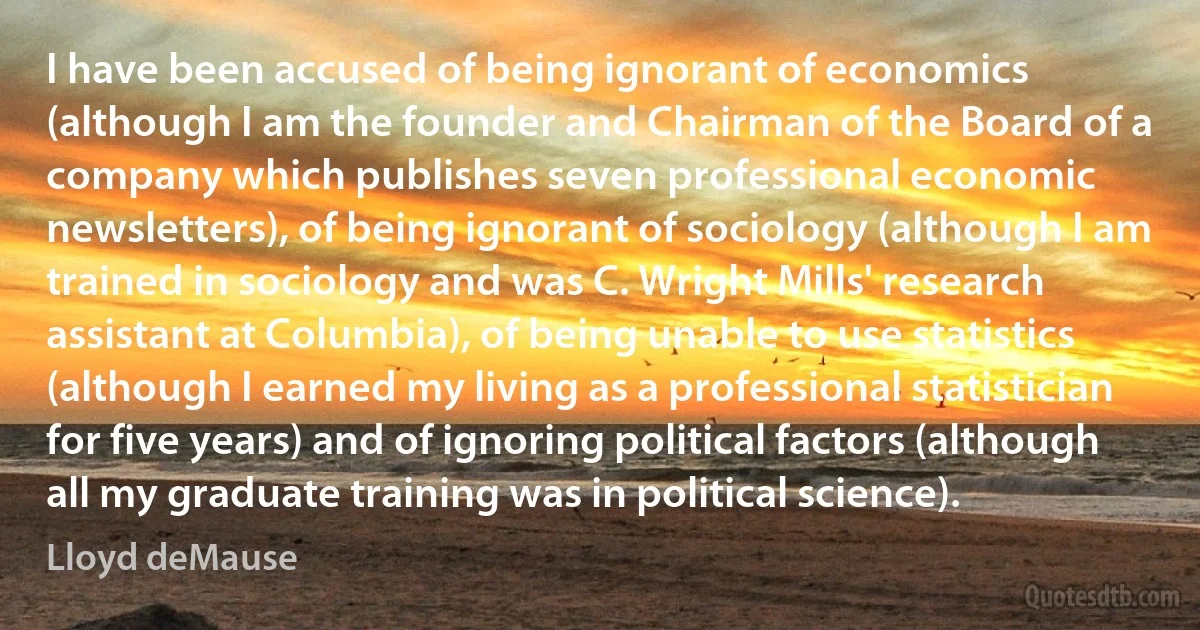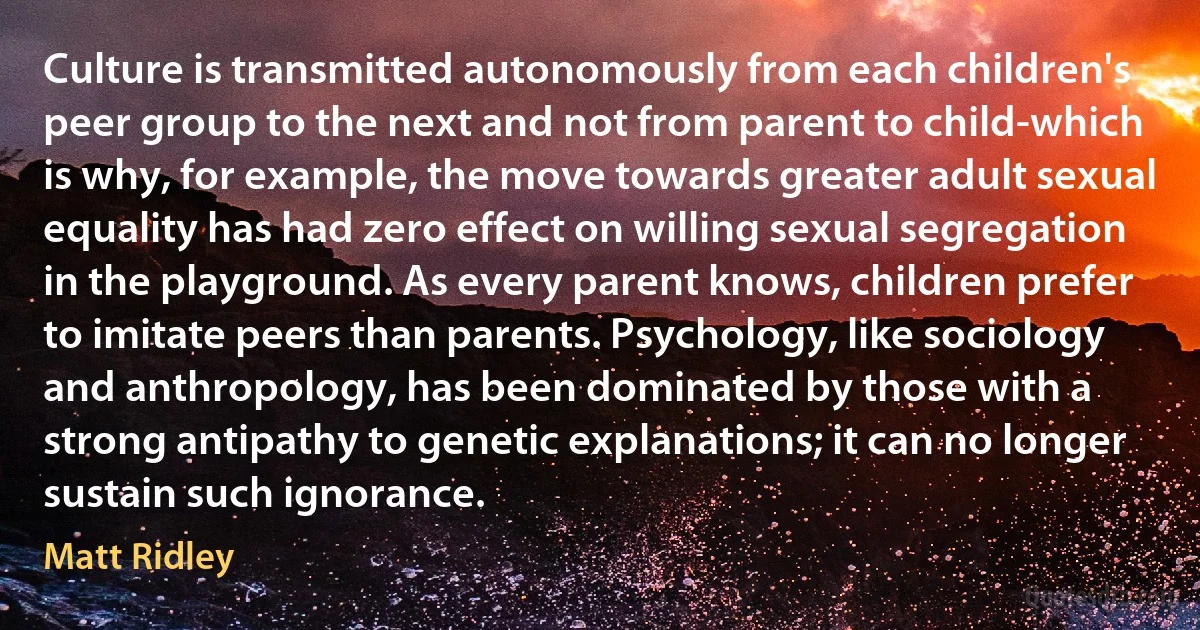Sociology Quotes - page 6
Before I became a film major, I was very heavily into social science, I had done a lot of sociology, anthropology, and I was playing in what I call social psychology, which is sort of an offshoot of anthropology/sociology - looking at a culture as a living organism, why it does what it does.

George Lucas
Exploring maps as representation forges important links between cartography and a variety of cognate fields concerned with this topic in its various facets (including geographical information systems [GIs] and remote sensing, as well as art, cognitive science, sociology, cognitive and environmental psychology, semiotics, and even the history and philosophy of science).

Alan MacEachren
The application of psychoanalysis to sociology must definitely guard against the mistake of wanting to give psychoanalytic answers where economic, technical, or political facts provide the real and sufficient explanation of sociological questions. On the other hand, the psychoanalyst must emphasize that the subject of sociology, society, in reality consists of individuals, and that it is these human beings, rather than abstract society as such, whose actions, thoughts, and feelings are the object of sociological research.

Erich Fromm
Sociology does not ‘negate' philosophy, in the sense of taking over the hidden content of philosophy and carrying it into social theory and practice, but sets itself up as a realm apart from philosophy, with a province and truth of its own. Comte is rightly held to be the inaugurator of this separation between philosophy and sociology.

Herbert Marcuse
I have been accused of being ignorant of economics (although I am the founder and Chairman of the Board of a company which publishes seven professional economic newsletters), of being ignorant of sociology (although I am trained in sociology and was C. Wright Mills' research assistant at Columbia), of being unable to use statistics (although I earned my living as a professional statistician for five years) and of ignoring political factors.

Lloyd deMause
The liberal-hearted who run the newspapers and the university English departments and organize the bookstores have turned literature into well-meaning sociology. Thus do I get invited by the editor at some magazine to review your gay translation of a Colombian who has written a magical-realist novel. Trust me, there has been little magical realism in my life since my first trip to Disneyland.

Richard Rodriguez
In the Clunie Public Library in Sacramento, in those last years of a legally segregated America, there was no segregated shelf for Negro writers. Frederick Douglass on the same casement with Alexis de Tocqueville, Benjamin Franklin. Today, when our habit is willfully to confuse literature with sociology, with sorting, with trading in skins, we imagine the point of a "life" is to address some sort of numerical average, common obstacle or persecution. Here is a book "about" teenaged Chinese-American girls. So it is shelved.

Richard Rodriguez
What is new in work democracy is: that for the first time in the history of sociology, a possible future regulation of human society is derived not from ideologies or conditions that must be created, but from natural processes that have been present and have been developing from the very beginning.

Wilhelm Reich
Throughout time, leading thinkers, academicians, and government leaders have attempted to develop an understanding of how to build peace. Many approaches have been explored, all attempting to create favorable conditions for peace. These solutions have drawn from economics, history, international law, comparative peace studies, conflict resolution, political science, sociology, anthropology, and more. Prem Rawat's message of peace is rooted in the need for each person to find peace within themselves. He emphasizes that whether our search is for world peace or for personal peace, we very much need to look at the search for peace as a personal quest, rooted in an understanding of who we are.

Prem Rawat
There is no science of sociology. Perhaps there will be, some day, when a rigorous physics gives a finished science of colloidal chemistry and that leads in turn to a complete knowledge of biology, and from there to a definitive psychology. After that we may begin to know something about sociology and politics. Sometime around the year 5000 A.D., maybe-if the human race does not commit suicide before then.

Robert A. Heinlein
We stand up and the judge leaves, and Michael turns to me and says, "Bob, the jury system is much older than 200 years, isn't it?" I said, 'Well, yeah, it goes back to the Greeks." He says, "Oh yeah, Socrates had a jury trial, didn't he?" I said, "Yeah, well, you know how it turned out for him." Michael says, "Yeah, he had to drink the hemlock." That's just one little tidbit. We talked about psychology, Freud and Jung, Hawthorne, sociology, black history and sociology dealing with race issues. But he was very well read in the classics of psychology and history and literature.

Michael Jackson
We humans have always defined ourselves by narration. What's happening today is that we're allowing multi-national corporations to tell our stories for us. The theme of corporate stories (and millions drink them in every day) seldom varies: to be happy you must consume, to be special you must conform. Absurd, obviously, yet our identities have become so fragile, so elusive, that we seem content to let advertisers provide us with their version of who we are, to let them recreate us in their image: a cookie-cutter image based on market research, shallow sociology, and insidious lies. Individualism is bad for business – though absolutely necessary for freedom, progressive knowledge, and any possible interface with the transcendent. And yes, it's entirely possible to function as a free-thinking individual without succumbing to narcissism..

Tom Robbins
...when any new idea was suggested in religion, in medicine, in science, in economics, in sociology, and indeed in almost any field of thought, the first question which the learned body having charge of that field and making a living out of it would ask itself was not whether the idea was good and true and would tend to the general welfare, but how it would immediately and directly affect the set of doctrines, traditions, and institutions, with the prestige of which their own personal interests were identified.

Edward Bellamy
Noam Chomsky's pessimism, "neither history nor psychology nor sociology gives us any particular reason to look forward with hope to the rule of the new mandarins," may be excessive; there are as yet no historical precedents, and the scientists and intellectuals who, with such deplorable regularity, have been found willing to serve every government that happened to be in power, have been no "meritocrats" but, rather, social climbers. But Chomsky is entirely right in raising the question: "Quite generally, what grounds are there for supposing that those whose claim to power is based on knowledge and technique will be more benign in their exercise of power than those whose claim is based on wealth or aristocratic origin?" (Op. cit., p. 27.)

Noam Chomsky



